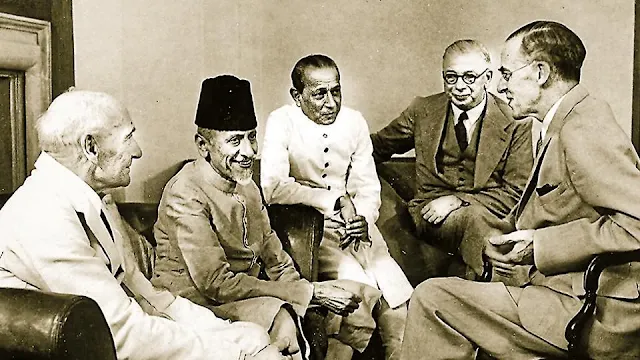National Education Day
India celebrate National Education Day on November 11 to memorialize the birthday of Maulana Abul Kalam Azad, the first Minister for Education in India.About Maulana Abul Kalam Azad
His real name was Abul Kalam Ghulam Muhiyuddin and also known as Maulana Abul Kalam Azad or Maulana Azad. He was born on 11 November, 1888 in Mecca now which is in Saudi Arabia, and died on 22 February 1958 in New Delhi.
Date of Birth: November 11, 1888
Place of Birth: Mecca, Saudi Arabia
Father's Name: Muhammad Khairuddin
Mother's Name: Alia Muhammad Khaieuddin
Spouse: Zuleikha Begum
Education: Homeschool, Self-taught
Political Party: Indian National Congress
Notable Publications: Ghubar-e-Khatir, India Wins Freedom
Awards: Bharat Ratna (posthumously awarded)
Date of Death: February 22, 1958
Cause of Death: Stroke
Memorial: Abul Kalam Azad tomb, New Delhi, India
Maulana Abul Kalam Azad was a remarkable person who was good at many things. He was a freedom fighter, a journalist, and a reformer. He really cared about building his nation and believed that education was important for this. He played an important part in the Indian National Congress and even became its President in the years 1923 and 1940. In 1912, he started the weekly publication "Al-Hilal" to criticize British policies and shed light on the issues faced by Indians during that era. Because of all the great things he did, even after he passed away, Maulana Abul Kalam Azad was given a very special award called the Bharat Ratna. This award is India's highest honor for civilians, and he received it in 1992.
The History of National Education Day
In September 2008, India's Ministry of Human Resource Development decided to celebrate Maulana Abul Kalam Azad's birthday as National Education Day. They wanted to honor this great man for his important work in building the country's education system. This day is not only about remembering him but also a time to look at how well India's education is doing and find ways to make it even better.
When India became independent in 1947, it had a huge challenge ahead – to improve and stabilize its various systems. The leaders of the country knew that education played a very important role in building a strong nation. So, they started to concentrate more on this crucial aspect to make the country better. Maulana Abul Kalam Azad, with his expertise and passion for education, became a symbol of this cause. In 1948, during the All India Education Conference, he stressed the importance of providing basic education to every individual as a birthright, enabling them to lead fulfilling lives while fulfilling their responsibilities as citizens.
Maulana Abul Kalam Azad was in charge of the Central Advisory Board of Education, and he played a very important role in getting rid of illiteracy in the country. He advocated for widespread elementary education and promoted the expansion of secondary education, especially for girls. One of the big things Maulana Abul Kalam Azad did was creating the Indian Institutes of Technology (IITs).
When Maulana Abul Kalam Azad was leading, the first IIT was started in 1951.
Now, these institutes are known for their excellent education, and they are respected not only in India but also around the world.
Maulana Abul Kalam Azad's Contribution to Education in India
Maulana Abul Kalam Azad didn't just talk about education; he took action. He played a key role in creating educational institutions that still impact India's education system today.
Jamia Millia Islamia: Maulana Abul Kalam Azad helped create Jamia Millia Islamia, which was first in Aligarh, Uttar Pradesh. Later, with his help, the university moved to New Delhi in 1934.
University Grants Commission (UGC): When he was the Education Minister, Maulana Abul Kalam Azad set up the University Grants Commission on December 28, 1953. This commission is very important as it looks after the educational standards in India.
Indian Institutes of Technology (IITs): He had a great idea to encourage research and technology growth, so he started the first IIT in 1951. Now, IITs are famous for their education and research. Today, IITs are prestigious institutions known for their academic excellence.
Promotion of Arts and Culture: He was involved in the establishment of various institutions to promote education, arts, and culture, including IISc, School of Architecture and Planning, Sangeet Natak Akademi (1953), Sahitya Akademi (1954), and Lalit Kala Akademi (1954).
Maulana Abul Kalam Azad National Fellowship: In his honor, the Ministry of Human Resource Development introduced the Maulana Abul Kalam Azad National Fellowship to provide financial assistance to minority students pursuing M Phil and PhD degrees.
Institutes Named after Maulana Abul Azad Kalam
To further commemorate Maulana Abul Kalam Azad's significant contributions, several educational institutions bear his name:
- Maulana Azad Medical College in New Delhi
- Maulana Azad National Institute of Technology in Bhopal
- Maulana Azad National Urdu University in Hyderabad
- Maulana Azad Centre for Elementary and Social Education
- Maulana Azad College
- Maulana Abul Kalam Azad Institute of Asian Studies
- Kolkata's Maulana Abul Kalam Azad University of Technology
- A Central (Minority) University in New Delhi
- Maulana Azad Library in the Aligarh Muslim University
- Maulana Azad Stadium in Jammu
Conclusion
Maulana Abul Kalam Azad's contributions to education and nation-building are immeasurable. His vision, dedication, and relentless efforts have left a lasting impact on India's educational landscape. By celebrating National Education Day, we not only honor his memory but also reaffirm our commitment to providing quality education to all and striving for educational excellence in our great nation.





.png)
![GUNTUR KAARAM | Full Movie Free Download HD [480p, 720p, 1080p,4k]](https://blogger.googleusercontent.com/img/b/R29vZ2xl/AVvXsEhrf2augJYBPyr0rjLCbIcu7M2OcmZEAqr5CO_3yrik_RcXVvlzxGlzxdOG1OtCQ9V8QG9rzUH6yd8fP5WfBmhvN1NI2nal72g7CLD5jx_MkacLGpi4fDMLNyYn_jDldPzXyyVR_WhbXm8uaS7pSKBB_550U5Gwfji8J7MDm9kShyqn6KfiWJq0h0Vib06j/w72-h72-p-k-no-nu/download%20GUNTUR%20KAARAM.webp)

![Aquaman 2 [Aquaman and the Lost Kingdom] || Free Download Dual Audio MP4 || 720p || 1080p](https://blogger.googleusercontent.com/img/b/R29vZ2xl/AVvXsEg7ssLYxywyDL0d4XvTKyc6BsTthcvpTMbp20k3hB2adewG04UBMAAXeJ8lsMVMz-P1rFTHjstfCJ8-4Vb3mYs4t1eriNB288SguyxAj2n3Aoe72h7PoDar310yaTuTroEY5VJQPDOdqobzC3eb7aZeRxLk6zPjQvbSXxtLdoJmkrI4uq7aPY6Jhkq_lrLP/w72-h72-p-k-no-nu/AQUAMAN%202.webp)

![Deadpool 3 | Full Movie Free Download With HD Quality [480p, 720p, 1080p, 4K]](https://blogger.googleusercontent.com/img/b/R29vZ2xl/AVvXsEhH0oy2qpxN-kXtHntJBc8bI5T0sUaNJTA7LI8AJPGAxWcReVCQ1D7ysGiK0nKmi067YYqphhOaqlQxfck9OTTE3ecFH3yIUu3sMO7wlZOPoDslMj0EPHcj3Hp_VDmUL7l3Y2AjLT3N40_0q_oJ_MN4JtqUxp9RS-eBIEGSnVDJWN3PQ-fZIAiEUj6X7QyQ/w72-h72-p-k-no-nu/Deadpool%203-%20quickupdate4you.webp)

![Oppenheimer (2023) | Full Movie Free Download With Dual Audio[480p, 720p, 1080p, 4K HD]](https://blogger.googleusercontent.com/img/b/R29vZ2xl/AVvXsEgqn79ACG4A0XYl0jZJC2_aW8fW9yLhiyV8khqW3mOotvYkrW5lbPrFG6_I8Y_Knyb3cW3wLHZQzt3XiyDs82nKiCuw_npJ9uV-p-5mPxi3x2734ZdxW5Y2JweP02AzQgmx05xKV3hfXjuG9n7Sk3Weat4g1bdRQ2l-C2zxLvyo8sxHFaZhayUmc97_5haH/w72-h72-p-k-no-nu/Openheimer%20(Film)%202023.webp)

0 Comments
Leave Your Comment